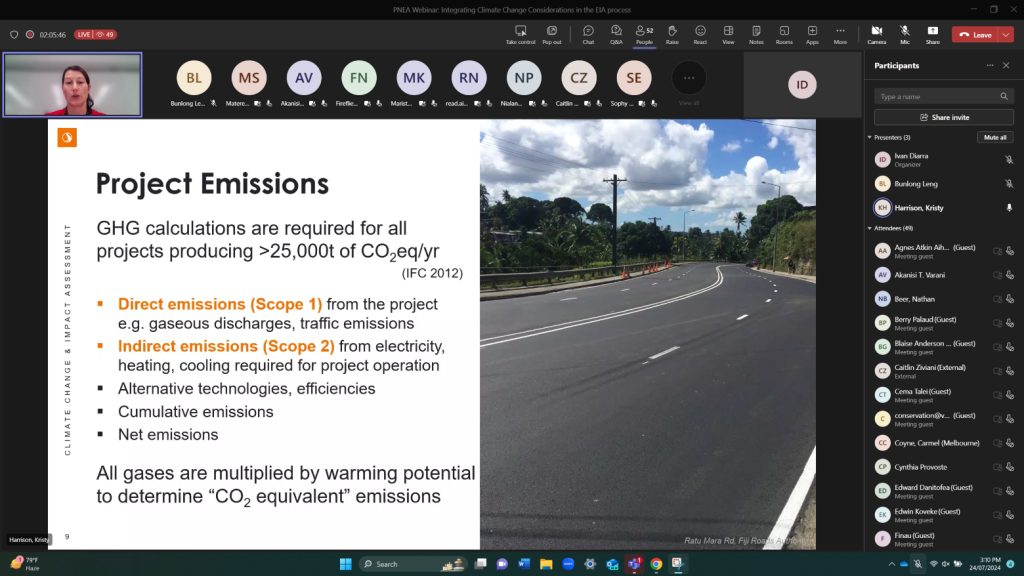
Building upon lessons learnt from each other when it comes to integrating climate change considerations into Environmental Impact Assessments was at the core of a regional webinar that saw over 60 virtual participants engage in meaningful discussions to grow our Pacific expertise.
The Secretariat of the Pacific Regional Environment Programme (SPREP) hosted the "Integrating Climate Change Considerations in the Environmental Impact Assessment Process" webinar organised by the Pacific Network for Environmental Assessment (PNEA).
"This webinar demonstrates your commitment to addressing one of the most pressing challenges facing our Pacific communities,” said Mr Jope Davetanivalu, the Director of Environmental Monitoring and Governance as he addressed the participants virtually.
“As environmental professionals and key national stakeholders in resilient and sustainable development across the region, we have a critical role to play in ensuring that development projects are designed and implemented in a manner that is climate-resilient and sustainable.”
Participants explored the unique vulnerabilities of Pacific Island nations to climate change and the consequent importance of addressing these issues in EIAs. The speakers discussed various challenges in integrating climate considerations into the EIA process, including institutional, technical, and financial barriers. They also emphasised the need for strategic planning and policy updates to support climate-inclusive EIAs.
Ms Kristy Harrison, Group Leader for Environmental Science at Stantec New Zealand, shared practical insights and case studies on implementing climate-resilient EIAs across various sectors including coastal development, transport networks, energy supplies, and water resources.
"Every country, whether they're in the Pacific or not, has an infrastructure deficit. There's always a gap between the money that you need and the money that you must invest in this space,” said Ms Harrison as her presentation stressed the role of strategic planning as well as the importance of considering whole-of-life emissions in project assessments and the potential of nature-based solutions in climate adaptation strategies.
“That's why being strategic and having things like your country infrastructure plans, your Urban Development plans can really help invest your money wisely. It's getting away from that blinkered single project focus."

During the virtual discussion, a strong focus was on the practical methods for assessing both the impact of projects on climate change and the impact of climate change on projects. This dual approach is crucial for ensuring the long-term sustainability and resilience of infrastructure and development projects in the Pacific region.
"We need to keep pushing for impact assessments to consider climate change aspects. It may not be there because of other priorities, but we need to make a balance. Either we want to move faster, or we want to have more quantities of road lengths, or we want to move slower and consider the quality of our infrastructure investments, “said Dr Bunlong Leng, Environmental and Social Framework Specialist accredited by the World Bank. Dr Leng presented a case study from Cambodia, highlighting the challenges and opportunities in implementing climate-resilient road infrastructure projects.
“We do consider that the quality of investments takes into account not only the traditional mindset of environmentally and socially sound, but also climate resilience and whatever green clean development that we're talking about."
The webinar featured an open discussion where participants raised important questions about sea level rise forecasts, carbon emissions from fishing vessels, and the potential for climate change litigation. These discussions highlighted the complex and interconnected nature of climate change impacts and the need for holistic approaches in EIAs.
The webinar concluded with a call for continued collaboration and knowledge sharing among Pacific Island nations to enhance climate resilience in development projects. Participants expressed interest in further capacity building and the development of regional guidelines for integrating climate change considerations into EIAs.
SPREP will continue to facilitate discussions and capacity building on this crucial topic in line with its mandate to preserve.
The "Integrating Climate Change Considerations in the Environmental Impact Assessment (EIA) Process" Webinar was held on 24 July 2024 bringing together over 60 participants from across our Pacific region, and featured Dr Bunlong Leng, Environmental and Social Framework Specialist accredited by the World Bank and Ms Kristy Harrison, Group Leader for Environmental Science at Stantec New Zealand.
The Pacific Network for Environmental Assessment is supported through the European Union initiated capacity building project phase 3 titled, “Capacity Building related to Multilateral Environmental Agreements (MEAs) in African, Caribbean and Pacific (ACP) Countries”, implemented by UN Environment programme and executed by SPREP.
For more information, contact Director for Environmental Monitoring and Governance, Mr Jope Davetanivalu, ([email protected]), Environmental Assessment and Planning Officer, Mr Puta Tofinga ([email protected]), or the Pacific Network for Environmental Assessment Technical Officer, Mr Ivan Diarra ([email protected]).